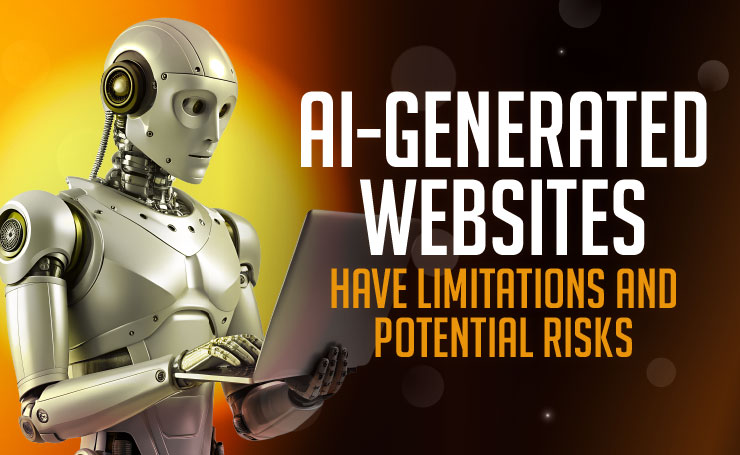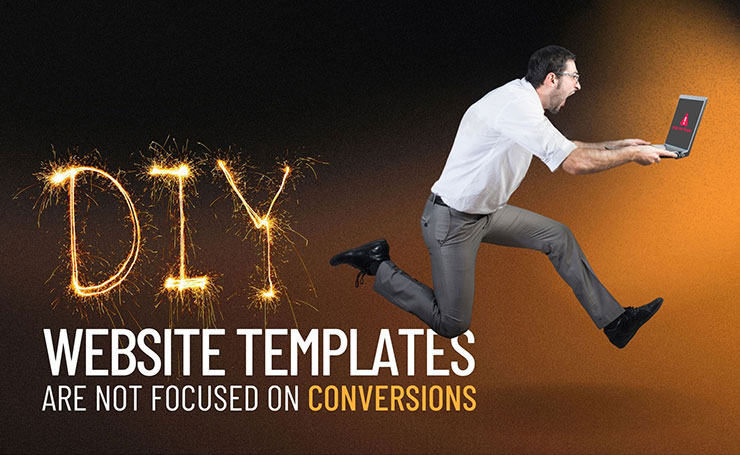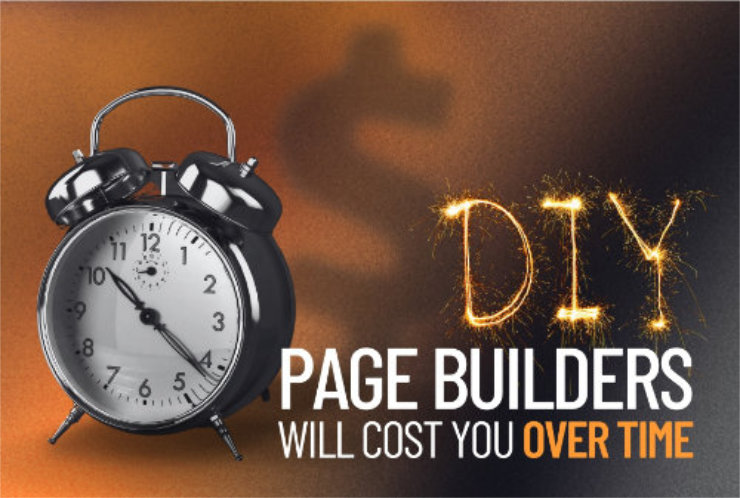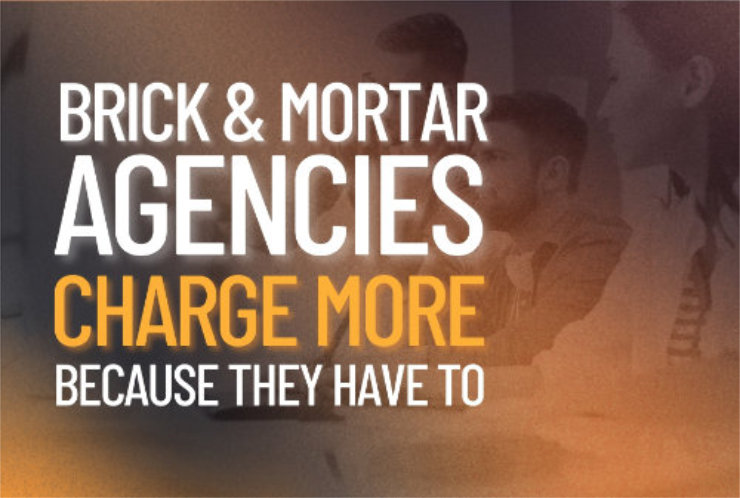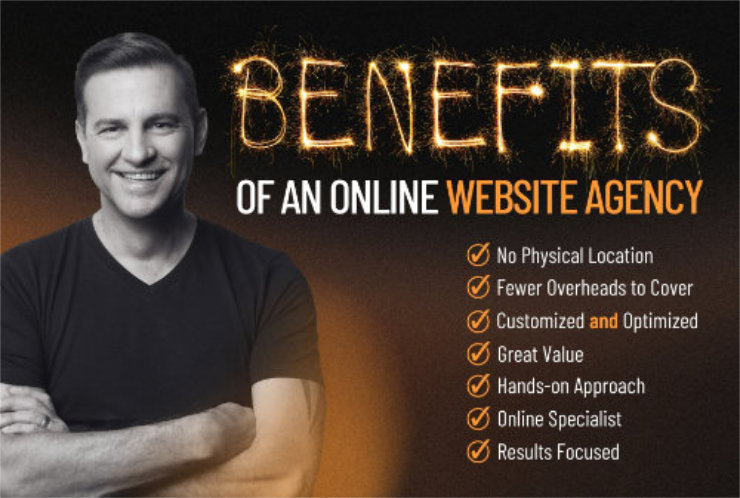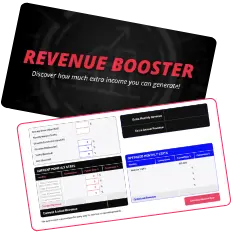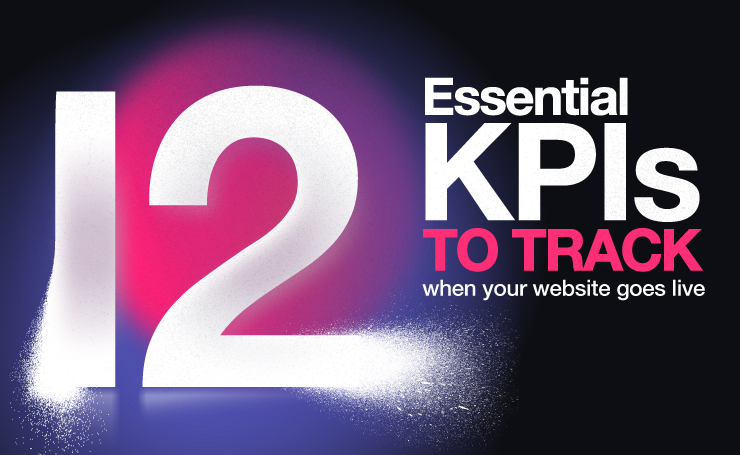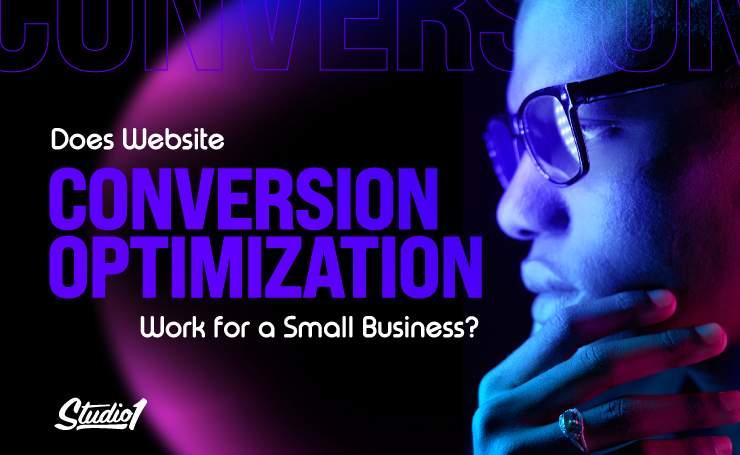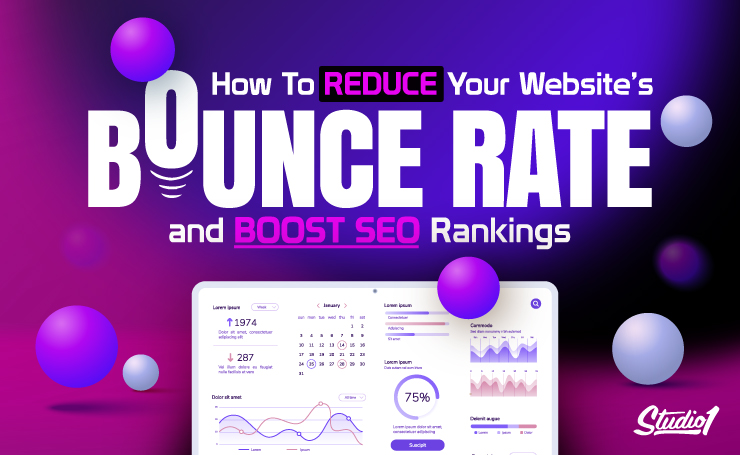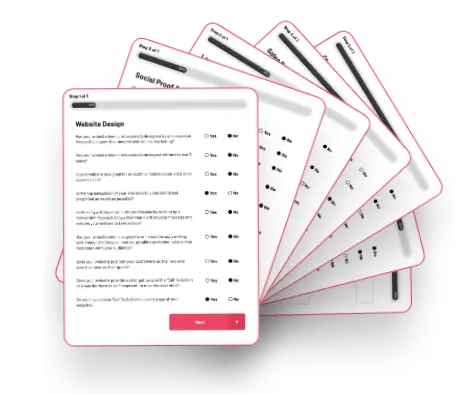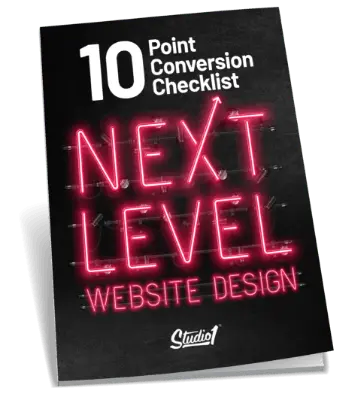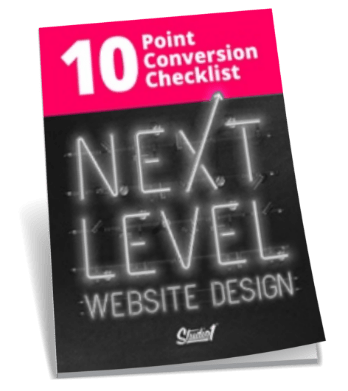Is your website starting to look outdated, slow, or failing to convert visitors?
With all the advancements in technology over the past few years, it’s no wonder your current website might fall behind the times.
You know you need a new website, but where do you start? How much should you pay for one that will attract, engage, and convert your audience in 2025’s fast-paced online world?
Don’t worry—we’ve got you covered. In this guide, we’ll walk you through the website options available in 2025, from quick-and-simple solutions to high-powered custom builds.
By the end, you’ll have a clear path to choosing the best fit for your business.
Where do you start and how much should you pay for a website in 2025?
With so many options and price points, it’s easy to feel like you’re drowning in choices. And let’s be honest—a wrong decision here doesn’t just cost you time; it could mean losing valuable leads and sales instead of increasing conversions.
Decision fatigue sets in, making it harder to make a confident choice. When that happens, the risk of making a costly mistake only grows.
To avoid falling into this trap, follow these three simple steps:
- Look at your business needs and set a goal and outcome that you would like to achieve with your new website.
- Write down the problems that your current website has and review the broad categories of website solutions to see which one solves those problems.
- Decide on which solution best meets your needs, and your budget aligns with your goals and timeline.
Let’s dive deeper into each of the three steps:
Step 1: Clarify your website goals for 2025
To make sure your new website is set up for success, start by clarifying your specific goals. Think about where your business is today and what you want to achieve in the coming year. Ask yourself:
- Conversion Goals: Are you aiming for more leads and sales, or to grow your audience?
- Are you launching a new product or service and want to see how your audience responds?
- Has your business or market changed significantly, requiring a website update to stay relevant?
- Is growth a priority for your established business, and are you aiming to strengthen your brand and boost sales or leads?
- Do you plan to design and build the website yourself, or would you prefer to work with a professional team?
- Are you familiar with designing a conversion-focused website that’s optimized for results?
- Do you have a specific deadline for when you’d like your new website to launch?
Setting these goals upfront will guide every decision, ensuring your website is aligned with both your current and future business needs.
Step 2: Identify the problems with your existing website
Write down the issues with your current website, which may include…
- Lack of leads and sales: Your website isn’t generating the results you expect.
- Outdated appearance: Your website looks dated, boring, or fails to stand out from competitors or attract your target market.
- Poor brand representation: Your website doesn’t reflect the quality of your product or service and doesn’t position you as an expert in your niche.
- Limited functionality: Your website isn’t a “24/7 marketing machine” that brings in the right prospects and entices them to take action.
- SEO and performance issues: Your website is losing search engine rankings each month, and it keeps slowing down due to outdated coding and a patchwork of plugins held together like duct tape and zip ties!
Whatever your situation and the challenges your website currently faces, the sad truth is…
IT’S JUST NOT WHO YOU ARE ANYMORE…
Once you know you’re clear on the two steps above, the next step is to get serious about understanding what it takes to attract the right audience and convert them into paying customers.
To stay competitive in 2025, your website will need:
- A visually compelling, unique design that captures attention and draws your audience in, making them want to do business with you.
- A modern, forward-thinking look that reflects your brand’s identity, sets you apart from competitors and establishes you as a leader in your industry.
- Clear, persuasive copywriting that speaks directly to your audience, educating and motivating them to take action.
- A high-performance build with up-to-date coding for faster load times, improved SEO, and an effortless user experience.
- User-friendly editing capabilities that allow you to easily make updates, ensuring your content and design stay relevant as your business grows.
- Ongoing conversion optimization to continuously test, analyze, and refine design and messaging elements, ensuring the highest possible conversion rates as user behaviors and trends evolve.
By incorporating these features, your website will be a powerful tool for converting visitors into buyers and amplifying your business impact.
Step 3. Review your website options and choose the best fit for your business growth
The options below show you the pros and cons of the choices available. Decide on which solution best meets your goals, needs, and budget that aligns with your timeline. Let’s start with the newest option…
AI-Generated Websites:
With advancements in artificial intelligence, AI-generated websites have become a popular option for businesses needing a fast, low-cost online presence. AI website builders use machine learning to generate basic layouts, images, and written content based on minimal inputs.
While the technology is impressive, AI-generated websites come with limitations and potential risks, including issues with copyright, and originality that can affect your brand’s credibility and long-term results.
Advantages of AI-Generated Websites
- Speed and Simplicity: AI can create a basic website in minutes, offering a quick solution for simple projects or early-stage businesses.
- Affordable Price Point: AI-driven builders are budget-friendly because they eliminate human designers and developers.
- Basic Customization: Some AI tools tailor layouts and content to fit your industry, allowing for some basic customization.
Limitations of AI-Generated Websites
Despite these benefits, AI-generated websites fall short in several key areas:
- Limited Customization: AI relies on templates and structured layouts, which may make your website feel generic. This can lead to a “one-size-fits-all” aesthetic that limits your brand’s ability to stand out in a competitive market.
- Minimal Conversion Focus: AI-generated websites lack the strategic insights needed for conversion optimization. For instance, custom calls-to-action, data-driven content updates, and A/B testing—all critical to increasing your conversions.
- Potential for “Hallucinated” or Inaccurate Content: AI may sometimes “hallucinate” by generating unexpected, off-brand design elements or incorrect information, leading to confusing results that require manual review. This can detract from your brand’s credibility if left unchecked.
- Risk of Duplicate or “Borrowed” Content: AI tools are trained on vast datasets, which can sometimes result in unintentional reuse of phrasing, imagery, or layout styles seen on other websites. This overlap may weaken your brand’s uniqueness and create copyright risks.
- “Good Enough” Aesthetic: AI-generated designs are quite basic and look like another template website. This can be a disadvantage in competitive industries where first impressions and brand differentiation matter most.
Is an AI-Generated Website Right for Your Business?
AI-generated websites can work well for startups, personal projects, or businesses needing a simple, low-cost online presence.
Although AI-generated websites are a promising tool, the technology still has limitations and potential risks. If you choose to go this route, be prepared to carefully review the output to ensure it aligns with your brand’s message, originality, and long-term goals.
For businesses seeking an affordable hands-on approach, template-based websites may be a better option.
Off-the-shelf D.I.Y. Website Templates:
A template website is a pre-designed and pre-coded website that you buy “off the shelf”. You install the template on your domain, then add your content yourself.
You can expect to pay anywhere from $20 to $300-ish for a website template.
Some of the most popular D.I.Y. Website Templates are found at ThemeForest, TemplateMonster, Weebly, Wix, SquareSpace, etc.
Templates are great when you’re starting a business or testing a new offer. You can get a website template up and running quickly to see if your ideas work. A new website can be incredibly hard to visualize – so the right template can get your ideas out of your head and onto a screen.
Website templates have become increasingly popular in the last few years, thanks to, how many there are, how easy they are to install, and how much fun techies have played with them.
When you check out template sites on the internet, you’ll see just how many there are to choose from—ThemeForest alone has 58,000 templates!
Templates can be incredibly beginner-friendly. Most only need a couple of clicks, and “hey presto” – they’re installed on your domain.
Because there are lots of templates to choose from, there’s almost certainly a theme that caters to the industry you’re in. And they’re cheap, too!
Templates have their limits and diminish over time!
No matter how “cheap” templates seem, they have hidden costs down the track. If you don’t understand their limits, you could impact your business visibility and long-term website performance.
Template-based websites are like off-the-peg clothing. The design is usually quite generic and it’s often not flexible. Like off-the-peg clothing, you have to fit the template and the way the template works.
Overall, templates can’t be customized very easily. They do what they were originally created for. They’re not built or designed for your unique business, or optimized around your content and offer. If your business changes, a template won’t change with you.
Templates can break over time. They’re coded for a particular version of a particular content management platform (like WordPress). As the software around the template changes, the layout and content can stop displaying correctly.
They will probably work fine for a while, but over time as you start trying to customize it and add plugins, it doesn’t look like you hoped, it gets slower and things break. Eventually, your frustration usually leads to wanting to start again with a better solution.
So they’re great for startups, they’re great for trialing a new offer – HOWEVER…
Once you’re making money, it’s time to invest. Invest in both creating a unique visual brand AND in converting the engine room of your website into getting you a positive result. A result that looks great and will be a reliable website tailored to your unique business.
Will a template work for your growing business?
Templates are ideal for “soft-launching” an offer. They let you get a website out there quickly!
However, over time template websites tend to run into some key issues:
- Not optimized. Templates are meant to be used by thousands of people, which means they’re made to be generic. Instead of your web design working around your content, you often have to tailor your content to fit the template design.
- Not original. Since templates are available for everyone to use, there are likely a dozen other businesses using your template right now. It goes against your site’s memorability if your website design looks too familiar.
- Not Focused On Conversions. Some templates may look pretty, using all the bells-n-whistles latest design trends, however, most of those trends will hurt conversions and not boost them. If they use display effects like parallax, sliders, video backgrounds, and other fancy animations they will (1) slow down your website AND (2) frustrate and distract your visitors.
You may not need an entire website though. You may only need a landing page, so read on…
D.I.Y. landing page builder templates:
If you are out to test a new business idea or offer, then you may NOT need a whole new website. You may be better off creating a single landing page to promote your offer and see if your target market is interested in your offer.
A landing page is a single web page that offers one specific thing. It’s focused on explaining the benefits of that offer, who it’s suited to, and why people should take you up on your offer. It’s designed to get visitors to say “yes” to one specific action, whether that’s a free trial, an opt-in, or a purchase.
D.I.Y. page builder templates are web pages that you can build yourself from pre-set drag-and-drop components. You install a landing page template on your domain then add your own content.
There are many landing page builders, with a range of tools at various price points. Most of them charge around $100 – $300 per month.
That is great value initially if you’re testing an offer for a short time. However, if you stay with them for years, they end up being more expensive than a fully custom website!
Some of the most popular landing page builder platforms are Clickfunnels, Leadpages, Instapage, and Hubspot.
One of the best things about landing page builders is that they’re quick to install and easy to use, so you can make a new online offer fast.
Landing page builders are also designed to be mobile-friendly and some come equipped with AI-enhanced features, such as automated A/B testing and adaptive content based on user behavior. You can integrate them with pay-per-click (PPC) ads to reach audiences where they do much of their research—on mobile devices.
Like any D.I.Y. project, a landing page builder can soak up a whole lot of time and energy. To make the most of your investment, you’ll want to have a whole lot of marketing clarity before you start – especially about your target market, your offer, and your USP.
Consider a DIY landing page builder if you want to:
- Test a new offer with your existing audience; OR…
- Refine or improve an existing offer; OR…
- Test multiple offers for a short amount of time
Once you have tested and validated your offer, consider moving successful landing pages to your own website, so that you own the asset. While landing page builders provide a lower-cost, temporary option, recurring monthly fees add up over time, making a custom website or a fully integrated landing page more cost-effective in the long run.
If you have tested your offer and it’s converting, then read on to discover a couple more options on how to take your website and brand to the next level.
Here’s one of those options to choose from…
‘Brick-and-mortar’ website agencies:
Location-based website agencies bridge the gap between wanting a new website and having a new website. If they’re really good, you may only need a couple of meetings with the agency.
You explain your goals, share your content, and pay their fee and the agency handles everything—from conceptualizing the design, coding, testing, and optimization.
The Pros: Brick-and-mortar agencies offer a comprehensive, hands-off experience that minimizes effort on your part. They often have in-house teams for every aspect of your site, including graphic designers, developers, project managers, and marketers.
The Cons: The downside of specialized website agencies can sometimes be their expensive price tag. Hiring a full-service agency involves paying for their overhead, from office space and staff to equipment and insurance. As a result, traditional agencies tend to charge premium prices.
Many brick-and-mortar clients are mid-to-large-sized businesses that need specialized functionality, custom programming, or an advanced online marketing strategy.
Choosing the right agency: Due diligence is key
Read this article on how to find the right website design agency.
Finding a website agency is like hiring an auto mechanic. If you’re not familiar with the inner workings of your car, then it’s easy to get stung.
You don’t really know what you’re paying for—you’re just telling them what the problem is and then waiting for them to fix it. If you haven’t chosen wisely, you could end up paying more than you should.
Looking for a new website agency needs care and investigation – because you need someone honest AND someone with real competence.
To safeguard your business, look for established, well-run companies that make sure they maintain their reputation by delivering excellent work.
Regardless of how much you like them and how well they seem to understand you in your first meeting, make sure you get evidence that they really can meet your needs.
A good website agency will be more than willing to show you what they can do – they’ll have case studies plus before-and-after examples, along with video and written testimonials.
What to expect from “brick-and-mortar” agencies:
A brick-and-mortar agency requires minimal time on your part, making it an ideal investment for busy businesses that want an experienced team to take the lead. (And it IS a marketing investment, not just a cost.) They are usually very good at what they do, so you will most likely get a good result.
However, the convenience comes at a cost. Here’s what to keep in mind:
- Project-Based Fees: Expect to pay anywhere from $25,000 to $120,000 or more for comprehensive, custom websites with full-service agencies, especially if they include advanced features like AI-driven personalization, complex integrations, or e-commerce functionality.
- Hourly Rates: Rates can now range from around $300 to $700+ per hour in major cities (like New York or San Francisco), with more regional agencies averaging $300 to $500 per hour.
One thing to be aware of is that when you pay a “bricks-and-mortar” agency, you’re also paying for their in-house designers, their marketing, their utility bills, and their office rent, among others.
If you still want an outstanding website that gets you a great result, without an expensive ‘bricks-and-mortar’ price tag, you may want to consider hiring an ‘online website agency’ that has a leaner business model and can offer you a better price.
Online Website Agencies:
Online website agencies can specialize in creating custom websites designed to drive results—not templates, but unique, tailored designs built specifically for your business. Without the overhead of brick-and-mortar agencies, online agencies offer competitive pricing without sacrificing quality.
For an online agency, reputation is everything. To stay competitive and trusted, they need to deliver results, especially in areas like conversion optimization and digital performance. Unlike traditional agencies, online agencies are deeply familiar with the online landscape, positioning your website for success in today’s digital market.
The Approach: Personalization, Optimization, and Performance
A good online agency will have a structured, client-focused process to understand your goals and vision. Expect to complete a detailed questionnaire and participate in a comprehensive online interview, ensuring they capture what’s unique about your brand. (If an agency doesn’t take the time to learn about your needs—consider it a red flag!)
Expect to answer a detailed questionnaire, and then participate in an online interview process to add more detail. (If your chosen agency doesn’t have lots of questions – think again!)
Benefits of online website agencies:
When you work with an experienced, reputable online agency, you gain unique advantages:
- Access to Global Talent: Online agencies draw from a global pool of top-tier designers and developers, bringing specialized skills that are not limited to a single location.
- Lower Overhead, Greater Value: Since online agencies don’t run big, central offices, they don’t have to worry about paying rent, utilities, or large office teams, so online agencies can pass these savings to you. That means they can deliver great websites at competitive prices.
- Fewer overheads to cover. Since online agencies don’t run big, central offices, they don’t have to worry about paying rent, electricity, water, and the Internet. That means they can deliver great websites at competitive prices.
- Customized, unique AND great value. Online website agencies produce high-performance websites as well as any traditional brick-and-mortar website agency – just more affordably. They work with you to make sure your website is 100% optimized and ready to launch.
- Hands-on approach. Online website agencies are generally smaller, more connected, and more agile than traditional brick-and-mortar website agencies. They choose people who enjoy what they do and care about their client’s results. If they take you on as a client, you know that they’re committed to working with you to deliver a site that you are proud of and that gets you great results.
- Conversion Optimization. Some online agencies now provide ongoing conversion optimization services that go beyond the initial launch. By regularly analyzing user behavior, testing new strategies, and refining design elements, they ensure your website stays agile, competitive, and responsive to changing trends—maximizing conversion rates over time.
- On-Demand Graphic Design Support. For businesses with evolving needs, some online agencies can offer flexible, ongoing access to skilled design support. This can include creating fresh landing pages, updating graphics, or making design tweaks. This on-demand support helps you keep your site visually current and engaging without committing to new projects every time you need updates.
- They Walk The Walk. Every website agency you speak to will claim to be an expert in online marketing. However, online website agencies have to be experts in online marketing; it’s how they find clients and build their reputation! If you’re going to trust a website agency, trust one that walks the walk!
How much are online website agency services?
You can expect to pay between $7.5k & $25k depending on how many pages and funnels are required, and if you need an entirely new brand look and feel across your entire online presence.
If you are quoted less than $7.5k, be careful that you aren’t locked into an ongoing hosting fee. Lower-cost offers may come with ongoing monthly hosting fees that could limit your ownership or control. In some cases, agencies may retain the right to take your website offline if you decide to stop paying these fees and often charge extra if you want to move away from them, so be sure you fully understand the terms.
At Studio1Design.com we provide great results for our clients, without charging a ridiculous price tag, thanks to our lean online business model.
We specialize in high-converting websites—designed and built to deliver optimal performance. Every page and design element is crafted to boost your reputation, communicate your brand, and drive more leads and sales. With a strategy that’s built to skyrocket your success, our designs help transform your website into a powerful marketing asset.
In addition to custom web design, we offer a comprehensive Brand Blueprint. This includes logo design, a mood board, brand direction, and a detailed style guide, giving your brand a cohesive look and feel across every touchpoint.
The style guide serves as a valuable resource for any creative professional working on your brand, ensuring a consistent and professional presence across all marketing channels.
In today’s competitive market, a unified brand identity is key.
Read this article to discover why branding is more important than ever in today’s competitive market.
In Summary: Focus on the results, not just the price
To help you decide which option to go for, ask yourself:
- How much value will each option bring to my business?
- What is the result I want to get out of my website?
If you’re ready to invest in a website that functions as a 24/7 marketing machine, an online website agency like ours could be the perfect partner to take your business to the next level.
Book a free strategy call with us—no pressure, no obligation. It’s simply a friendly conversation to explore what you want your website to achieve and how we can help. Our goal is to help you create a website that maximizes impact, drives conversions, and supports your growth every step of the way.
We’ll show you how we will take your website and brand to the next level, so you can have a bigger impact and convert more visitors into action-takers.
Take a stroll through our latest Design Transformation Portfolio here, and see what “stunning websites that convert” look like – then imagine what we could do for your business…

